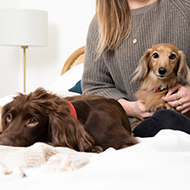Survey finds dog owners less depressed during COVID-19 pandemic

"Our work adds to a growing body of evidence demonstrating the power of the human-pet bond, especially in times of stress" - Francois Martin MA PhD.
A recent survey has discovered that dog ownership may have helped to support dog owners over the course of the COVID-19 pandemic.
Held online by Purina, the survey asked 1535 current dog owners, and potential dog owners to assess depression, anxiety, happiness, attitude and commitment toward their pet and perceived social support, using validated psychometric scales.
The findings of the survey identified that those who owned a dog had a higher perceived level of social support.
Of the respondents, 67 per cent felt that the pandemic had an emotional impact on them, however, on average, dog owners had a lower depression score.
Libby Sheridan MVB MRCVS, Purina scientific affairs manager form the UK and Ireland, commented: “The survey provided a unique opportunity to shed light on whether dog ownership would help to reduce or buffer the negative psychological effects of COVID-19.
“The research aimed to build on prior evidence that suggests that dogs can contribute to their owner’s positive affective state - a psychological term describing when people are in generally positive frame of mind like excited, enthusiastic, and inspired.
“Purina also set out to gain a better understanding of whether the power of the pet-owner bond continued to persist during the pandemic. Not only was the effect of dogs shown to be positive, it was also measurable and statistically significant.”
Lead Purina scientist on the project, Francois Martin MA PhD, said: “Our research showed that dog owners fared better from a social support and emotional standpoint during COVID than people who like dogs but didn’t own one during the pandemic.
“Our work adds to a growing body of evidence demonstrating the power of the human pet bond, especially in times of stress.”
The full results of the survey are available to view here.



 The RCVS has announced a new version of its 1CPD mobile app, with enhanced features for veterinary surgeons and veterinary nurses to record their continuing professional development.
The RCVS has announced a new version of its 1CPD mobile app, with enhanced features for veterinary surgeons and veterinary nurses to record their continuing professional development.